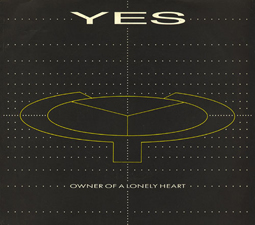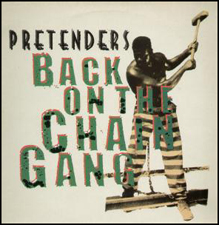Once more unto the breach, dear friends! As we cracked open Disc Five of this 7-disc mammoth, releasing a faint mingled scent of Pop Rocks, Aqua Net, and the first edition D&D Monster Manual, that eternal champion Dw. Dunphy was heard to say, “I’m fairly confident the series readership will call this one of the better weeks. I would now like to disabuse them of that notion.”
GAUNTLET: THROWN!
#1 Yes, ”Owner of a Lonely Heart” (1983)
The band’s only Number One.
Jack Feerick — So, Trevor Horn. We meet again.
Dw. Dunphy — I’ve already said way too much about this song. Just two thoughts are: I can still enjoy it as much as I ever had; and in the context of BritPop at the time this was pretty well within the sphere of all the rest. That’s not a put-down, either. This may be the only time in Yes’ existence where they were truly “contemporary.”
 Dave Lifton — A good ’80s rock song, but a lousy Yessong. I don’t mind this, but I’d rather listen to “Close to the Edge” any day.
Dave Lifton — A good ’80s rock song, but a lousy Yessong. I don’t mind this, but I’d rather listen to “Close to the Edge” any day.
Feerick — This record wasn’t really about the songwriting, or even the performances — it was all about the sound, especially the electric guitar tones: the massive fuzz roar of the intro, the tight clipped rhythm, the squealing harmonizer effect of the solo, the intricate picking — is that backwards? it sounds backwards — coming out of the middle-eight; and at least three or four other parts I’m leaving out. It’s less a song than a simplistic riff on which to hang an arrangement.
The arrangement is a tour de force, I don’t deny it. But all the tracks on 90125 were brilliantly arranged, and most of them go the extra mile and back it up with a song of substance. ”Owner” is not entirely without affect — the moment when the horns kick in and it shifts to the major, that still gives me a little thrill — but I would contend that ”It Can Happen“ or ”Changes” or even ”Leave It“ have a bit more there there.
And man, do those orchestral-hit sound effects sound dated. that’s what happens when you go ”contemporary.”
Dunphy — Regarding “Changes,” it’s probably my favorite on the record. It has all the changing rhythms but none of the obvious stuff of “prog.” Plus I love how the extended instrumental intro, which definitely is the flippy / weirdo time signature nonsense, suddenly just locks in and it is a cohesive, purpose-driven groove. Here we go, and this is not your older brother’s Yes.
Feerick — As someone who actually has an older brother who was a huge Yes-head all through the late 70s, let me just say: And how.
Dunphy — Plus, even though I am a huge fan of Steve Howe’s work, Trevor Rabin is a tremendous guitarist / frontman. I’ll say it again: it’s a crime that his solo Can’t Look Away didn’t make it.
Jon Cummings — I was never much of a fan of prog rock, outside the obvious hits that became album-rock staples, so I’ll leave it to others to locate this song’s place in that history. I’ll just say that it was, at first, quite odd to experience Yes having at top 20 hit, much less one that was all about a crunchy guitar hook and ’80s-esque noises that placed this song comfortably amongst tracks like “Twilight Zone” and “Der Kommissar” (which we covered last week). 90125, with all its MTV hits (including the craziness that was the … how many? … 27 videos for “Leave It”), seemed like an outlier at the time among Yes albums … and perhaps a direct response to Howe & Downes’ success with Asia. And it raised the question: What does a band like Yes do for an encore? The answer: form and deform and reform in a dozen permutations through the years, and never do anything nearly as successful again. Oh, well…
Feerick — I think my favorite was when half of Yes teamed up with half of Toto to form YOSO.
David Medsker — As crossover songs go, it’s sublime. The band could still flex their muscle (a little), and while the lyric wasn’t deep or thought-provoking, it wasn’t more of Jon Anderson’s time of day / time of season drivel, either. Trevor Horn steered the band well down the path between commercial success and artistic credibility, but I’m a bit biased on that front, since the Horn-fronted Drama is my favorite Yes album.
Dan Wiencek — A damn cool record. I have no brief with what lineup of Yes is or isn’t the optimal one. I dug the earlier prog stuff (well, I had Fragile, anyway) and I dug this. Kind of like the whole Gilmour / Waters Floyd / not-Floyd thing. You can call something bona fide or not, but in the end, it’s not up to you.
Um, yeah. Getting back to it, this is one of those tracks that’s dated in a fun way: it sounds quintessentially ’80s, but not in a tasteless, embarrassing way. And is anyone noticing that good guitar solos are becoming increasingly rare in these proceedings? Nice to hear someone working a six-string.
But how does being the owner of a lonely heart compare to being the owner of a broken gas fireplace? We’ll never know.
#2 Styx, ”Mr. Roboto” (1983)
Topped the Canadian charts; #3 US.
Feerick — Man, Brandon Flowers only wishes he sounded this theatrical.
Cummings — Is there space on the Internet for a serious evaluation of this song, that doesn’t snarkily reference Tommy Shaw’s eye-rolling on Behind the Music or Dennis DeYoung’s slow-motion descent into musical lunacy? There isn’t? OK. Then I’ll just recall that, as a serious, 17-year-old Styx fan in 1983 — that’s right, I admit it — I got more than a little queasy over “Mr. Roboto” and the generally sketchy themes of the Kilroy Was Here album, but decided to Just Go With It for a while and maintain my fandom through my arrival at college that fall. Once it became crystal clear that playing a Styx album in the dorm was a one-way ticket to social oblivion, Kilroy got tucked away permanently, and Paradise Theater rarely emerged again (and only under headphones).
Lifton — A Styx song so bad, even Wardlaw hated it.
Medsker — It pains me to confess that at one point in my life, I liked this song. Mistakes were made.
Wiencek — What the Sam Hill? This is like “Working for the Weekend,” a tune that’s become such a joke that I want to say something good about it just for the challenge. But … mmmmmm … no. Nothing’s coming. Maybe if DeYoung had conjured up this conceptual bouillabaisse five or seven years earlier, when the market was a little kinder to concept albums, it would have fared a little better. As it is, it’s so out of its proper time it’s baffling.
Does raise, at least for me, an interesting quandary: which ’80s concept album is more misguided, Kilroy Was Here or Roger Waters’ (him again!) Radio KAOS?
Dunphy — Well, as Mel Brooks was told about the fart joke in Blazing Saddles, “If you’re gonna go up to the bell, ring it.” Excepting the very good “Don’t Let It End” and the great ballad “Just Get Through This Night” from Tommy Shaw (sorry, Jefito…) I know of no other commercially successful band that put out as consistent a crap-filled Á©clair as Styx did with Kilroy Was Here. The album is about a future society that bans rock and roll, with a savior in Kilroy in its defense. So what does the band do? Release a record that is as un-rock and roll as pop had ever been at that point. “Mr. Roboto” is a short list of all the sounds of the day up to that moment rolled into one, with an insipid vocal performance replete with melodramatic enunciations and keyboards that sounded dated even for it’s year of recording/release.
As to why in 1983 this song became a huge hit, well, cocaine is a hell of a drug.
Feerick — So what is up with DeYoung’s accent here? ”Beyond me control,” saying ”mod-ren” for ”modern” — is he supposed to Irish? Or a pirate? So many questions.
When I was nine years old, grooving on ”Come Sail Away,” I thought Styx were not only catchy but profound. How wrong we can be.
Come to think of it, there are some odd malapropisms in ”Come Sail Away,” too — like, he clearly sings ”Ond every shore” in the first verse. Does Dennis DeYoung have some sort of weird dysphasic disorder?
#3 The Pointer Sisters, ”I’m So Excited” (1984)
Originally released in 1982, barely cracking the top 40. This remixed re-release in 84 hit the Top Ten.
Feerick — Some distinctly mixed signals being sent here. This is a straight-up booty call — the Sisters are revved up and ready to go; it’s a very frank admission of lust. So why the tease that ”If you move real slow, I’ll let it go”? Like, why wait? Why play like you’re gonna let that boy get up on it, when in truth you’d be disappointed if he didn’t? Look at the video — he has literally sent her an engraved invitation.
It’s a little late for playing hard-to-get, is what I’m saying. I can understand wanting to be seduced, but acting like he’s got slip one past you — that’s just messing with his head. And that’s no basis for a relationship.
Cummings — In the pantheon of Pointer Sisters singles off the hit machine that was the Break Out album, I’ll take “Automatic” over this or “Jump” — yet those latter two are the songs everyone remembers best. As a stereotypical anthem for the rah-rah, put-on-a-pastel-Benetton-sweater-and-make-a-ton-of-money ’80s, this song is tough to beat.
Lifton — I’m flashing back to five years ago the first Chart Attack podcast (back in the Wings For Wheels days) and Jason talking about Ruth Pointer’s Adam’s apple and his mom doing Jazzercise to “Jump (For My Love).” Whatever I said about the song back then applies to this one as well.
 Medsker — I got nothing here. Radio played it, it was easy to sing along to, but I was much more into “Automatic.” At least that one was a little weird.
Medsker — I got nothing here. Radio played it, it was easy to sing along to, but I was much more into “Automatic.” At least that one was a little weird.
Wiencek — My recollection was that this went from the charts more or less directly into a TV commercial for something, but I won’t swear to it. I remember being rather taken with the little piano break in the middle, a nice, surprisingly old-school touch in the middle of a very ’80s arrangement.
Feerick — I like the barrelhouse piano, too, Dan. There’s a hot little four-piece band buried in the mix here, and I’d like to hear more of them and less of the damned DX7.
That was a common trap, in the 1980s — producers seeing live bands and synthesizers as an either / or proposition When did that happen? When and why did keyboards stop being part of the band and start being an end unto themselves? And how was the rift healed and the balance restored?
Dunphy — This is the moment the Pointer Sisters would never be as respected again. Successful? Sure. But this is another one of those songs that would be appropriated (misappropriated) endlessly thereafter, to the point of uselessness. Though it made them a lot of money and I’m sure the surviving Pointers are still theoretically proud of it, they must also have a twinge of sadness that it is the same kind of circumstantial wallpaper as Kool & The Gang’s “Celebration.” Nobody really listens to it for pleasure anymore. They use it like paper streamers or crepe balls hanging from the ceiling. It was a something that now symbolizes nothing but party favors twisting in the wind.
#4 The Pretenders, ”Back On The Chain Gang” (1982)
The band’s only US Top 5.
Lifton — Remember those Old Milwaukee commercials where four guys would be out fishing and, at the end of the day, they’re sitting around a campfire and somebody says, “It doesn’t get any better than this.” That person never heard “Back on the Chain Gang.”
Cummings — Chrissie & Co. had to go mainstream at some point, and it’s just as well they did so with a boss track like this one. Has anyone ever tried mashing this up with Sam Cooke? In any case, I’m a bigger fan of “Middle of the Road,” though for well over a decade, whenever I think about how old I am, one of the benchmarks to which I compare myself is Chrissie’s definition of 33 as “middle of the road.”
Medsker — I understand why people point to Chrissie Hynde as a trailblazer, but I maintain that she’s also one of the most overrated icons (there’s that word again) of all time. They never made another album that sizzled even half as much as their first one, and yet they were given a Get Out of Jail Free card every single time. I’ll never understand it.
This might be my least favorite of their singles. It’s a toss-up between this and “Don’t Get Me Wrong.” They’re not particularly offensive — they’re just boring, which is arguably worse.
Wiencek — Kind of odd to think this is their highest-charting American hit, given its loping, rather unexcited mien. Not knowing much about the Pretenders then, I wasn’t quite sure what the big deal was when this came out. I get it more now; it’s a good song. Or rather, perhaps, it’s a decent song with a very good, commanding lead guitar line by Billy Bremner. What was that I was saying about no decent lead guitar to be heard anywhere?
Medsker — Also, isn’t there a line in “Chain Gang” about a pigeon from hell? What the fuck is that all about?
Wiencek — Obscure Birdman of Alcatraz reference?
Feerick — “Pigeons from Hell” is a short horror story by Robert E. Howard, set in a decaying mansion in the Deep South. It was adapted for TV in an infamous episode of the 1960s anthology program Thriller, which may have been where Chrissie Hynde heard of it.
Medsker — Does anyone else wonder if Chrissie would have written the songs she wrote if Pete Farndon and James Honeyman-Scott were still flanking her? Or would they have told her to stop being a tosser and sack up? I’ve clearly spent too much time thinking about this, which is funny, because I don’t really care one way or the other.
Feerick — Well, I’m pretty certain that ”Back On the Chain Gang” is about losing Pete and Jamie, so I’m not sure where you’re coming from with that.
If you mean, ”Would Chrissie have been writing and recording sentimental songs if Pete and Jamie had lived,” then I think it’s worth looking at those first couple of records again. Yes, Chrissie Hynde is one of the great sick jokesters of rock n’ roll, and songs like ”Tattooed Love Boys” and ”Precious” and ”Bad Boys Get Spanked” are musically aggressive and psychically toxic — but they exist cheek-by-jowl with the likes of ”Kid,” and ”Stop Your Sobbing,” and ”Talk Of the Town,” and even ”Brass In Pocket.” The band was always able to project both tough rock-chick attitude and tender vulnerability. If anything, ”Back On the Chain Gang” is a perfect fusion of the two.
What I always dug about Chrissie is that she always seemed a little older than the other rock chicks — not just more world-weary, but with a better sense of her own place in music history. She was fully steeped in what was just starting to be called ”classic rock.” (The fact that she was herself a former aspiring music journalist seems significant, here.) The allusions to Sam Cooke and classic soul, the country-surf sound of the lead guitar — in one way it’s a very conscious pastiche, exactly the sort of thing that onetime music journalist would come up with — but it has a disarming sincerity.
Dunphy — I’d forgive Chrissie Hynde almost anything at this point. This is just a great pop song with a band, not just a bunch of guys with a random pop tart at the microphone, as so much of the ’80s bands with female leads and Chrissie wanted it to be that way. I enjoy the Learning To Crawl album, with not one but three career-defining tracks on it, but I respect the integrity of Chrissie’s intentions much more. Let’s make good music. Let’s not take marketing as our primary function. She is definitely of a bygone era.
#5 Foreigner, ”I Want To Know What Love Is” (1984)
A Number One on both sides of the Atlantic.
Feerick — When I first heard this, a billion years ago, I thought it must be a joke. Turns out in retrospect that I was right after all.
Cummings — Schlock schlock schlock schlock schlock. I was all for “Waiting For a Girl Like You,” but this was a bridge (and, more specifically, chorus) too far.
My first two years of college, I worked with a girl who was probably the most mushy, sentimental person in history. She had a high-school boyfriend attending college 1,500 miles away, and was struggling mightily to stay together with him. One day sophomore year, we were walking to work together and she stuck into her Walkman a mixtape cassette he had just sent to her, with “I Want To Know What Love Is” and “I Can’t Fight This Feeling” back-to-back as the first two tracks. She started bawling, right there in the middle of the street — and three weeks later she had arranged to transfer to his college for junior year.
 And as nauseating as that story is, that’s my lasting memory of this song.
And as nauseating as that story is, that’s my lasting memory of this song.
Lifton — Another Chart Attack song! Jon’s right. It’s schlock and indefensibly shameless. They pretty much squandered all rock credibility by realizing just how much they could’ve made with “Waiting for a Girl Like You.” At the same time, you can’t deny Lou’s voice or Mutt’s ability back then to make a perfect sounding radio record.
Medsker — Staggering disappointment, from the moment I heard it. I’ll take “That Was Yesterday” any day of the week and twice on Sunday over this, which feels like a cynical attempt to recapture the magic of “Waiting for a Girl Like You.” Didn’t like it then, like it even less now.
Wiencek — You all might as well know this now: I haven’t been able to listen to Foreigner with anything resembling pleasure since I was very small. “Hot Blooded” was fun, back when I was young enough to ride in the back of a station wagon. By the time this thing came along … no.
Dunphy — The eventual curse of “Waiting For A Girl Like You” is that Foreigner would now be called upon to keep delivering ballads above what they did better… being a consistent pop/rock band in the Bad Company vein. Up to and including 4 each album had moments that are just solid rock moments, even if the lack of nuance and sensitivity dates them. Head Games, even with songs that are impossible to take to heart like “Dirty White Boy” and “Women,” has great rock tunes on it. 4 had “Girl On The Moon” which in my mind is equal to “Waiting…” and had production powerhouse Mutt Lange doing his process all over the thing.
But Agent Provocateur, co-produced by Mick (not the Clash) Jones and Alex Sadkin (who did Duran Duran’s Seven And The Ragged Tiger), lose the thread fast on this record. The rockers are desperate. “See? We still rock! Listen! AAAAAAAAGGGG!,” they seem to say. And the ballads, now the raison d’etre, are just oozing with AC schmaltz. There is nothing to cut the pure fat content. That’s what I see in “I Want To Know What Love Is” — it revels in the fact that it is bad for you, rather than being a guilty pleasure with some redeeming features, unnecessary gospel choir and all.





Comments